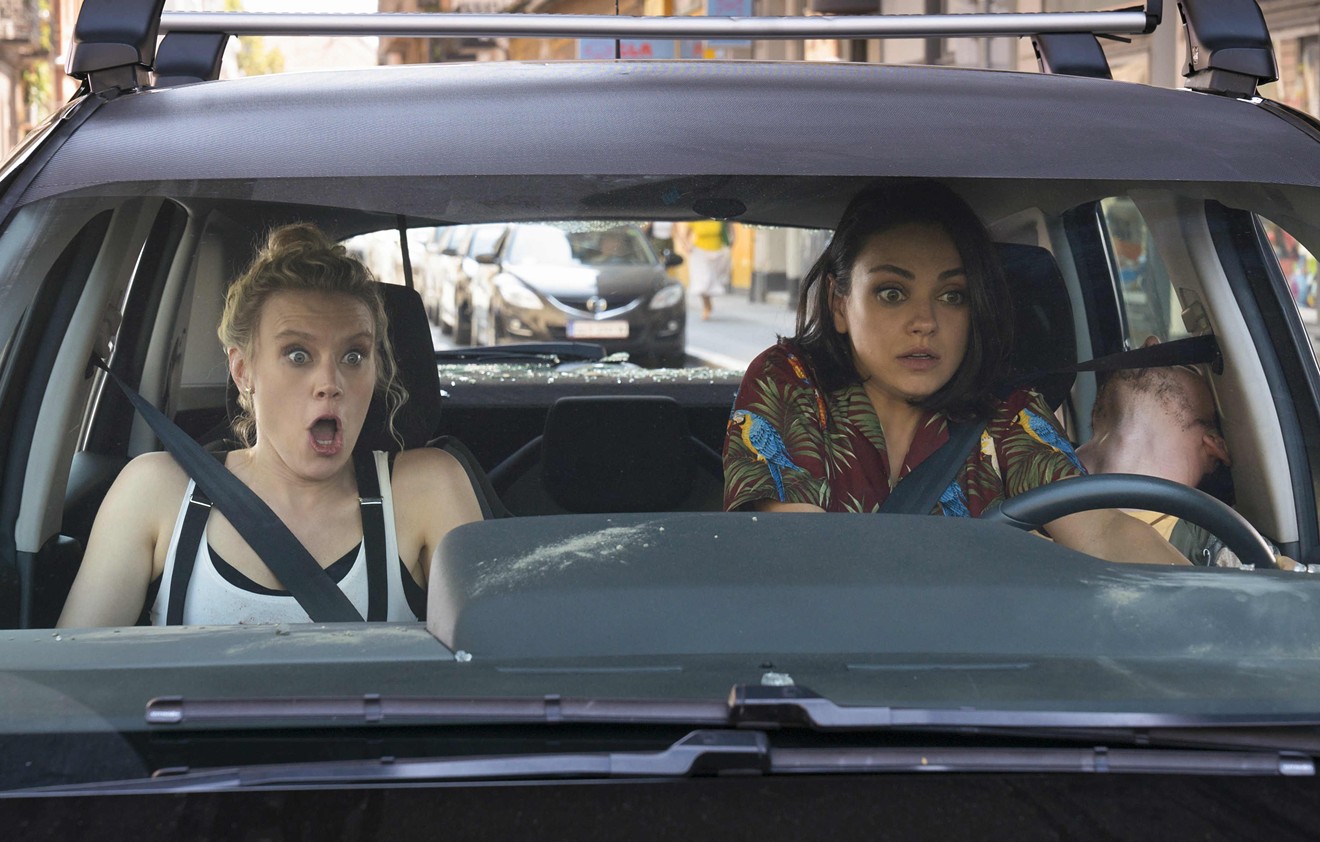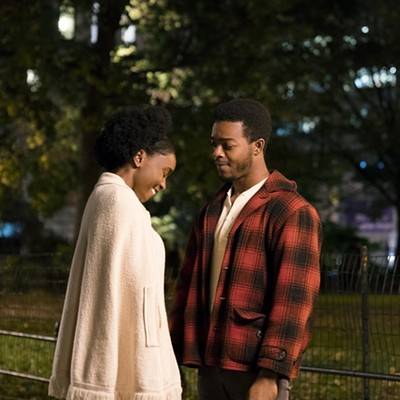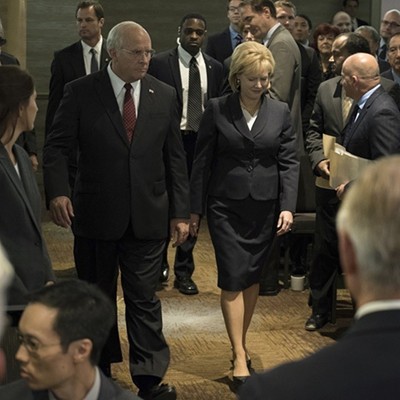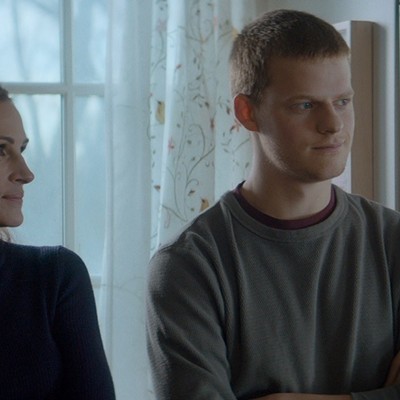Hollywood doesn’t know what to do with Kate McKinnon, so The Spy Who Dumped Me was perhaps inevitable. After stealing scenes on the margins of Ghostbusters and Rough Night, the cockeyed comic wonder has been given a co-leading role in the kind of wheezy cash-in breakout comics always turn up in: an on-the-run farce, pursued by goons or spies or gangsters. They gave one of these to Jay Leno once, pairing him with Pat Morita for 1989’s Collision Course, and that title kept occurring to me as The Spy Who Dumped Me’s car chases and triple-crosses noisily, often laughlessly, played out. McKinnon has for a couple of years now been on a collision course with just this sort of role, one that, in order to fulfill the dictates of programmatic movie plotting, demands she surrender much of what audiences love about Kate McKinnon.
Her great characters — Holtzmann in Ghostbusters, Jeff Sessions or that alien abductee on SNL, Rough Night’s horndog Aussie — are sublimely unhousebroken, elvin and punkish at once, given to flights of gonzo enthusiasm for what doesn’t matter to most people and who-gives-a-shit? disinterest toward what does. She’s more Puck or gender-fluid Harpo than Jay Goddamn Leno, but the writers, producers and director of The Spy Who Dumped Me pretty much ask her to do what Jay would do: to quip a little, to make can-you-believe-this? faces during the gunfights, to above all else keep the plot moving along.
Here, rather than some singular comic creation animated by its own daft impulses, McKinnon plays The Best Friend, someone who cares deeply about the specifics of the plot and offers words of encouragement that motivate her co-lead, Mila Kunis’ Audrey. These are marks any performer in Hollywood could hit, and giving them to McKinnon is extravagantly wasteful, like hiring Mary Halvorson, the brilliantly eccentric jazz guitarist and composer, to play straight leads over karaoke pop tracks. Why bother?
McKinnon does seize some moments in director/co-writer Susanna Fogel’s film. Five seconds of squirrelly dancing in the final scene proves funnier than most of the comic set pieces. In the buildup to the climax, her character has to go briefly undercover, and elects — for reasons of her own — to pass as a cockney man. But that sequence gushes along, setting up the ending, and the movie has no time to showcase McKinnon’s daft choices. She never gets a full minute to play. Most of her character’s quirks have been conceived to support a plot that is a rehash of a parody of a rehash, so there’s no room for McKinnon to make something fresh out of, say, the ongoing bit about her character dishing about every aspect of her life to her mother (played by Jane Curtin). That trait is a setup for later story twists rather than a springboard for surprising comedy; it’s beyond the filmmakers to make it both, just as it’s beyond them to make the action scenes and spy dramatics satiric rather than merely rote. This drably violent film doesn’t lampoon the silliness of the Mission: Impossibles so much as demonstrate by comparison how the skill with which they’re crafted.
McKinnon gamely tries to jump-start her lines, many of them generic R-rated comedy jabber about penises, sometimes scoring with an intonation or a corkscrewed expression. She’s given something of a comedy showcase at the climax, involving going undercover as a trapeze artist in a Cirque du Soleil show. But here, too, her comic inventiveness is subordinate to routine spy-movie set-piece-making. Amid all the quick cuts and (presumably) stunt performers, you can’t track McKinnon’s face. (One scene that works concerns the leads not realizing that the car they’ve stolen is a stick shift. For once, the chaos slows down, and we can enjoy the stars’ reactions.)
What’s lost in comedy is not matched by a gain in emotional engagement. Kunis is, as always, appealing, but her Audrey isn’t much of a character: She works at a Trader Joe’s knockoff, lives with her best friend and has just been broken up with, over text, by the boyfriend she doesn’t know is a spy. Turns out, his murder and then a bloody chase across Europe to protect a USB drive he had obtained are just what Audrey needs to find herself. The most interesting thing about Audrey is her intense friendship with Morgan, McKinnon’s character. Like the best recent studio comedies (Girls Trip, Blockers, Paul Feig’s far superior Spy), Fogel’s film is concerned at its core with relationships, with friends and/or family members trusting and supporting each other, a welcome leap from the asshole-runs-amuck comedies of the Anchorman era. But Morgan and Audrey aren’t specific enough to prove compelling, and McKinnon and Kunis only intermittently bring them to life. When McKinnon’s Morgan looks stung that a man tells her she’s “a little much,” it’s a surprise. Who knew she cared about or even noticed what anyone else thinks? And when Kunis’ Audrey has to mope, in the final act, over the loyalties of that one-time spy boyfriend, and then make a hard decision, it’s even more of a jolt: Oh, she’s been invested in all this? And we’re supposed to be, too?
Support Us
Houston's independent source of
local news and culture
account
- Welcome,
Insider - Login
- My Account
- My Newsletters
- Contribute
- Contact Us
- Sign out
The Spy Who Dumped Me squanders Kate McKinnon’s Kate McKinnon-ness
Alan Scherstuhl July 31, 2018 7:37AM

Kate McKinnon (left) plays Morgan and Mila Kunis is Audrey in The Spy Who Dumped Me, Susanna Fogel’s on-the-run farce that involves a boyfriend's murder followed by a bloody chase across Europe to protect a USB drive he had obtained.
Hopper Stone/Courtesy of Lionsgate
[
{
"name": "Related Stories / Support Us Combo",
"component": "11591218",
"insertPoint": "4",
"requiredCountToDisplay": "4"
},{
"name": "Air - Billboard - Inline Content",
"component": "11591214",
"insertPoint": "2/3",
"requiredCountToDisplay": "7"
},{
"name": "R1 - Beta - Mobile Only",
"component": "12287027",
"insertPoint": "8",
"requiredCountToDisplay": "8"
},{
"name": "Air - MediumRectangle - Inline Content - Mobile Display Size 2",
"component": "11591215",
"insertPoint": "12",
"requiredCountToDisplay": "12"
},{
"name": "Air - MediumRectangle - Inline Content - Mobile Display Size 2",
"component": "11591215",
"insertPoint": "4th",
"startingPoint": "16",
"requiredCountToDisplay": "12"
}
,{
"name": "RevContent - In Article",
"component": "12527128",
"insertPoint": "3/5",
"requiredCountToDisplay": "5"
}
]
KEEP THE HOUSTON PRESS FREE...
Since we started the Houston Press, it has been defined as the free, independent voice of Houston, and we'd like to keep it that way. With local media under siege, it's more important than ever for us to rally support behind funding our local journalism. You can help by participating in our "I Support" program, allowing us to keep offering readers access to our incisive coverage of local news, food and culture with no paywalls.
Alan Scherstuhl is film editor and writer at Voice Media Group. VMG publications include Denver Westword, Miami New Times, Phoenix New Times, Dallas Observer, Houston Press and New Times Broward-Palm Beach.
Contact:
Alan Scherstuhl
Follow:
Twitter:
@studiesincrap
Trending Film
- International Film Festival 2000
- It’s Sadly Kind of Perfect That New Season of GLOW Is Stolen by Marc Maron
- The Mysteries of Antonioni’s Blow-Up, a Half Century on
-
Sponsored Content From: [%sponsoredBy%]
[%title%]

Don't Miss Out
SIGN UP for the latest
news, free stuff and more!
Become a member to support the independent voice of Houston
and help keep the future of the Houston Press FREE
Use of this website constitutes acceptance of our
terms of use,
our cookies policy, and our
privacy policy
The Houston Press may earn a portion of sales from products & services purchased through links on our site from our
affiliate partners.
©2024
Houston Press, LP. All rights reserved.





